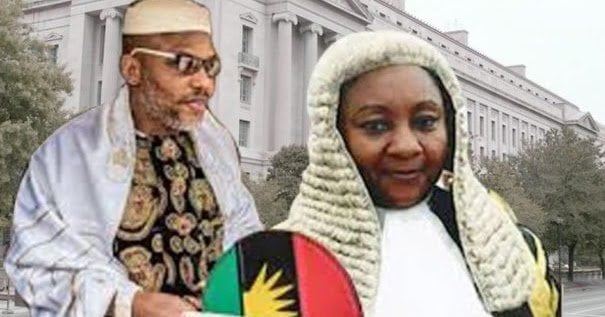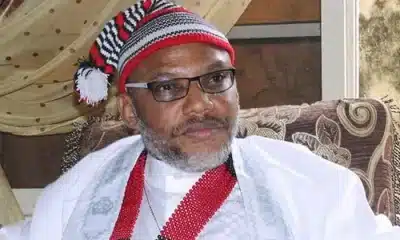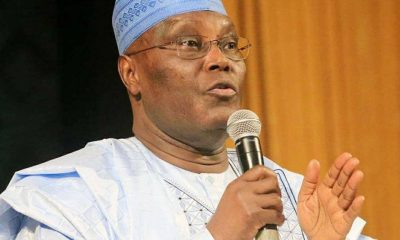Nigeria News
Biafra: Court Sets New Date For Nnamdi Kanu’s Trial

A Federal High Court sitting in Abuja has fixed March 31, 2020, for the continuation of the trial of Nnamdi Kanu, the leader of the Indigenous People of Biafra (IPOB).
Naija News reports that the court fixed the date after the Federal Government led by President Muhammadu Buhari asked the Federal High Court to reject a request to restore Kanu’s revoked bail.
The Buhari government filed a counter-affidavit before the court to oppose an application filed in April last year by Kanu seeking the restoration of his bail. The prosecuting counsel, Magaji Labaran filed the Federal Government’s objection to the application on January 17, 2020.
This online news platform recalls that before Kanu disappeared from Nigeria sometime in September 2017, he was being prosecuted on charges bordering on treasonable felony instituted against him as a response to his agitation on the IPOB platform for the secession of an independent Republic of Biafra from Nigeria.
The IPOB leader disappeared from Nigeria following soldiers’ invasion of his home in Afara-Ukwu, near Umuahia, Abia State, in September 2017. Kanu, a dual citizen of Nigeria and Britain, is believed to be currently residing in the United Kingdom.
Due to his consistent absence from court, the judge presiding over his case, Justice Binta Nyako, on March 28, 2019, revoked the bail she granted him in April 2017, ordered his arrest, and directed that the trial would continue in his absence.
By the court’s order, the IPOB leader who doubles as the Director of Radio Biafra, is expected to be arrested and brought before the country if apprehended in the country.
In response, Ifeanyi Ejiofor, the IPOB leader’s lawyer, on April 1, 2019, filed an application praying the court to restore the bail as a condition for Kanu to return to Nigeria to face trial.
But opposing the application in its counter-affidavit, the Federal Government, maintained that the IPOB leader, having allegedly jumped bail, was not entitled to be granted any indulgence by the court.
The counter-affidavit read, “That the defendant, in this case, is standing trial for treasonable felony and was granted bail by this honourable court.
“That the defendant has jumped bail.
“That three sureties that stood for him were asked to appear before the court and show cause after several adjournments at their instance.”
The counter-affidavit added, “That the defendant, since he jumped bail, has deliberately refused to submit to the jurisdiction of this court.
“That the defendant cannot seek any indulgence from this honourable court.”
The Federal Government said, “This court is functus officio”, implying that the court could no longer take any step aimed at reversing the decision revoking the bail except by a higher court.
In an affidavit filed in support of his application, Kanu had said he was “ready to stand trial if the safety of his life would be guaranteed by the Nigerian security agencies.”
Kanu claimed he “did not jump bail and has not voluntarily abstained from his trial to warrant the revocation of his bail and the subsequent order for his arrest.”
The affidavit added that the IPOB leader“was ever willing to stand his trial but for the unprovoked attack and bloody invasion of his residence by the Nigerian soldiers” in Afara-Ukwu, Abia State on September 17, 2017.
It noted that the “murderous raid” by the soldiers “left 28 unarmed and defenceless persons dead and many people abducted or injured”.
“That the applicant narrowly escaped death by a whisker and his subsequent and consequential absence from court was not volitional but was occasioned by the murderous invasion of his premises by the Nigerian Army,” the affidavit added.












